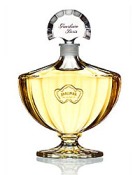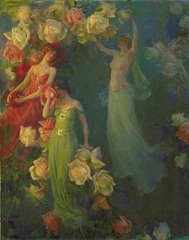What I find really strange is that some natural perfumers name famous perfumes as their favorites that are famous for their use of synthetics. Like Chanel no 5 which is famous for the high use of aldehydes. Or Shalimar that is known for the use of coumarine and ethyl vanillin. Both perfumes contain real animal absolutes and tinctures from civet, musk, castoreum and ambergrey. So what about the animal cruelty used for obtaining these products. How can you be against synthetics and animal cruelty and love the perfumes made of them? Maybe because they are classics? I really don't understand.
I like to give you an example of how Shalimar was made......

The notes and structure of Shalimar:
Shalimar contain a high percent of natural oils, real animal notes and balsamic notes.
It contain 2% ethyl vanillin(ethyl vanillin is 10 times stronger than vanillin), 9% coumarine.
The topnotes are made of bergamot 30%, other citrus oils, neroli and rosewood inclusive linalool. The bergamot, vanilla, coumarine together with the absolute of civet makes an "ambrein accord" this is enhanced by the use of Patchouli, sandal, vetiver, castoreum, leathernotes and cinnamon bark oil what gives a nice combination with the leather notes. It has rose notes like citronellol, geraniol and rose absolute. The coumarine is enhanced with the notes of tonka bean and benzoin.
This information I found in the book: Perfumery practice and principals by Robert.R.Calkin and J.Stephan.Jellinek.











4 comments:
Interesting point. I agree.....
I am a natural perfumer, but not a purist. So I can't speak for those who try to ride both sides of the fence.
I think that for so many. Some commercially produced perfumes are overbearing to the senses. Not that naturals are any less potent.
The bottom line is (in my opinion) quality of
product. A well crafted bottle of perfume is a work of art.
I can remember back to my first bottles of the original Zen,
and Caleche... I loved those perfumes, and would not have a problem wearing them today.
My interest these days is in natural isolates. some would call that going over the line. I find it all very fascinating, and am always learning new things. anything that makes me a better artisan, is worth the study.
I like the way you say it: It's about the quality of the product. And I agree, it's about using the right notes to achieve your goal. Sometimes I found it in the naturals and sometimes in the man-made materials. O and about Caleche I love it as well!
The natural isolates are interesting indeed, some would say it's not natural anymore. I wonder if there would be a great difference between the natural isolated and the man-made ones. The naturals are far more expensive and I wonder if you could smell the difference. In fact I will try to find out. I have a natural isolated nerol and will try to find the synthetic nerol to compare the two.
I think it comes down to the fact that so many of us can recognize the distictions between the behavior and activities of others versus our pride in own behavior and ethics...
For example, I am vegetarian, and am glad for synthetic musks and the like, so that real animals are not being misused or maltreated for perfume. But I struggle with the dilemma over perfumes that smell wonderful (and are masterpieces) that DO use animals in their production. I waver. I think a lot of folks do - not sure at what point to draw a line in the sand, since the sands are always shifting.
Products of animals do smell real good (when diluted)that's why the fragrances smell so great. I don't want to use the real animal products in my perfumes but I own a little bit of the real civet absolute, just because I was curious about how the real thing smelled, someone gave it to me. And it has a rich honey/leathery smell I think it's difficult to find a substitute for it. I have the powder of castoreum as well, it has a leathery/smokey wonderful smell, and I used it just for curiousity in a fragrance and it's wonderful, I hope I can find a real good substitute for it.
I understand that when a perfume has a wonderful smell it's difficult to say no to it, because it contain real animal products.
I was a vegetarian for a long time as well and I think when we had to kill the animals ourselves we maybe wouldn't eat it, you can't have double standards eating meat and being against animal products. But the differents is the way the animals are treated for some products.
Post a Comment